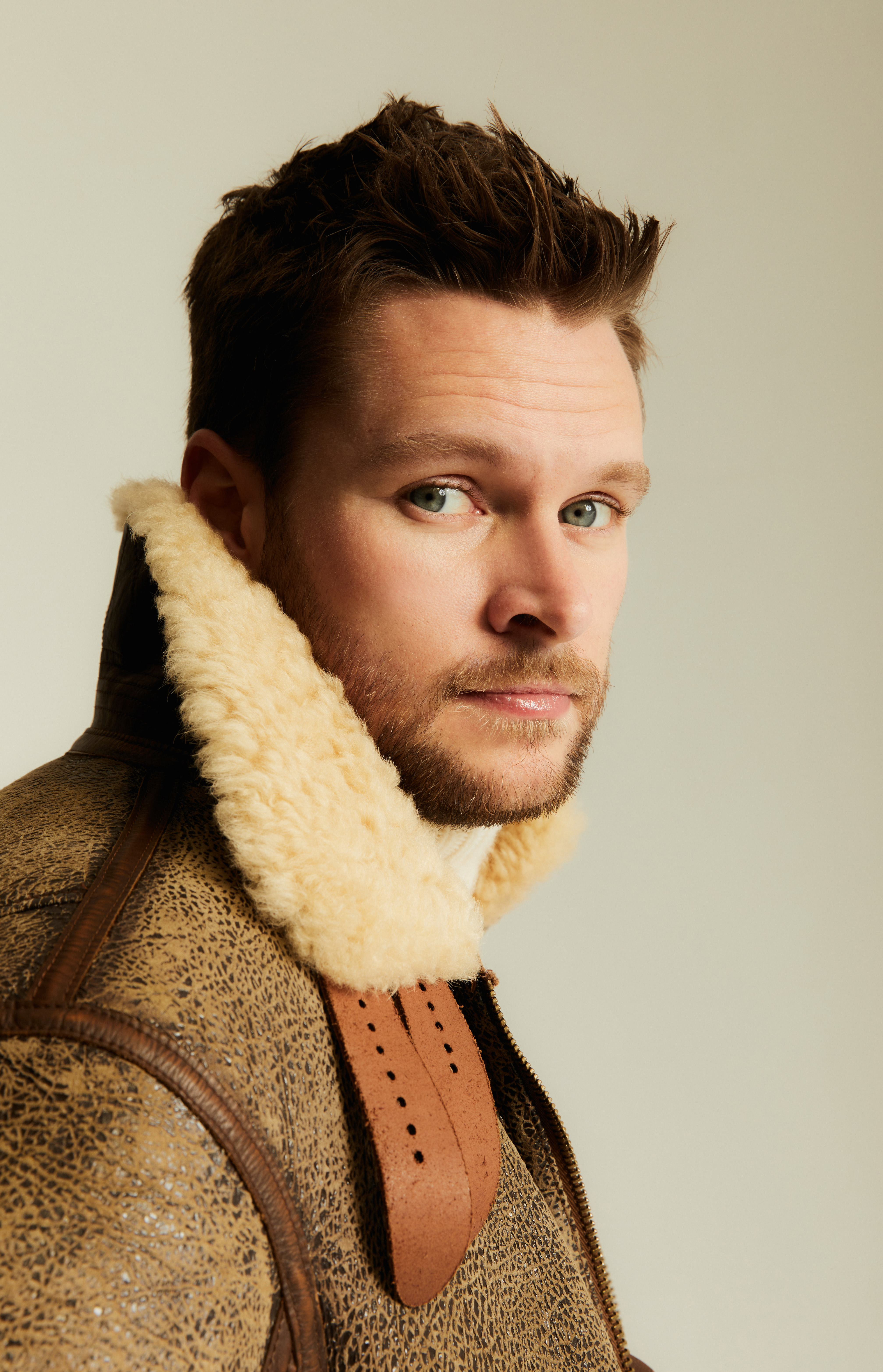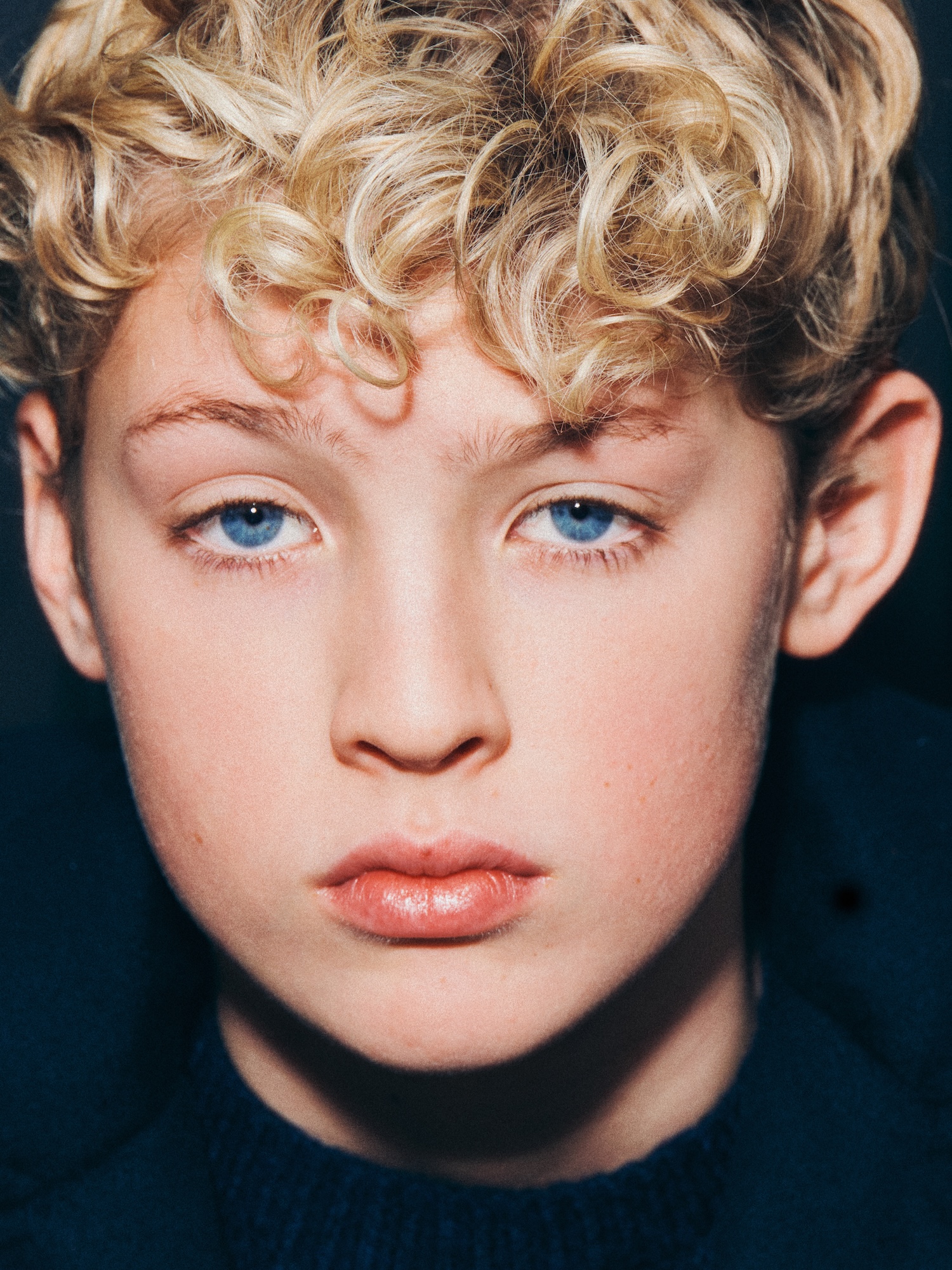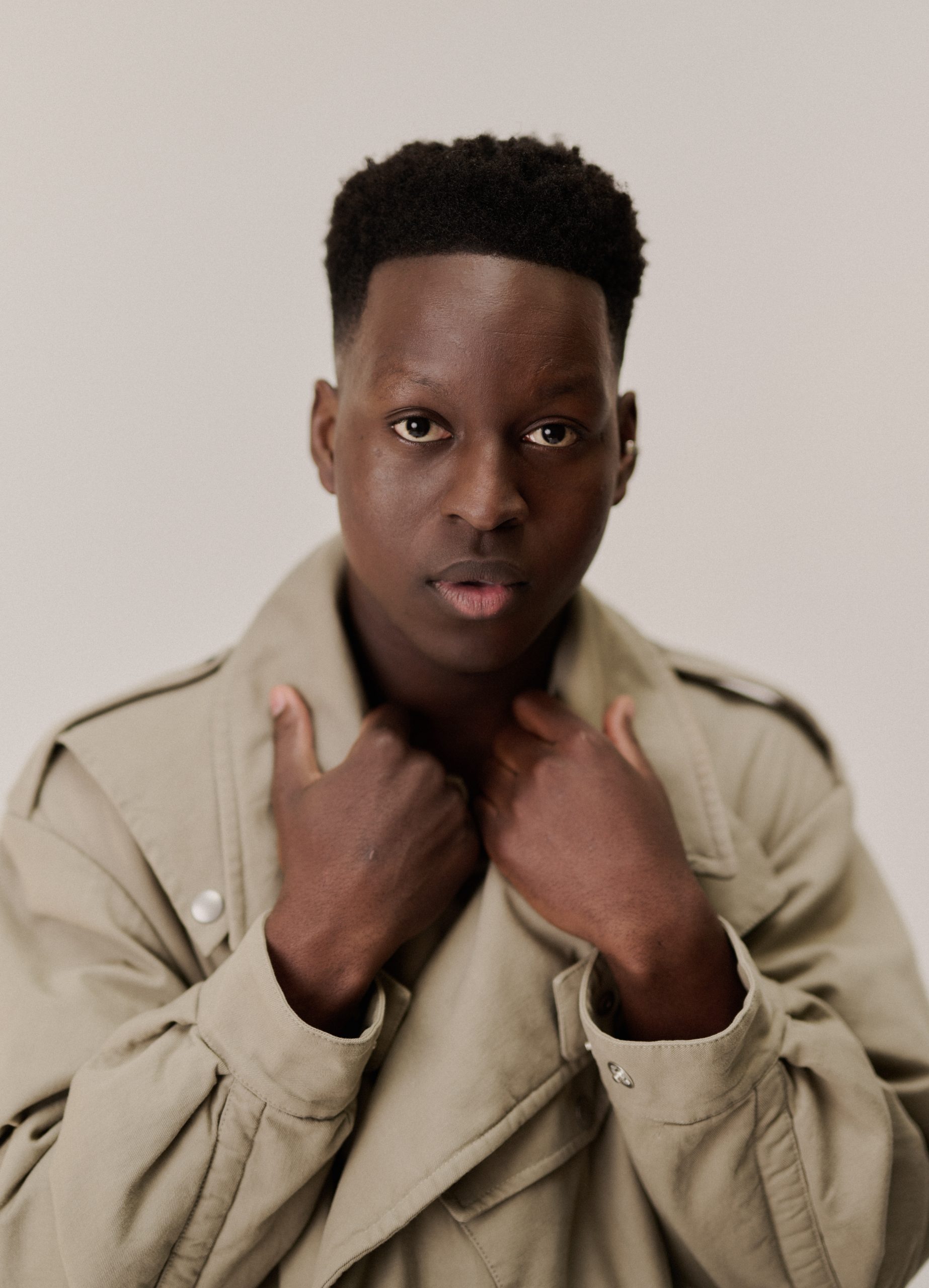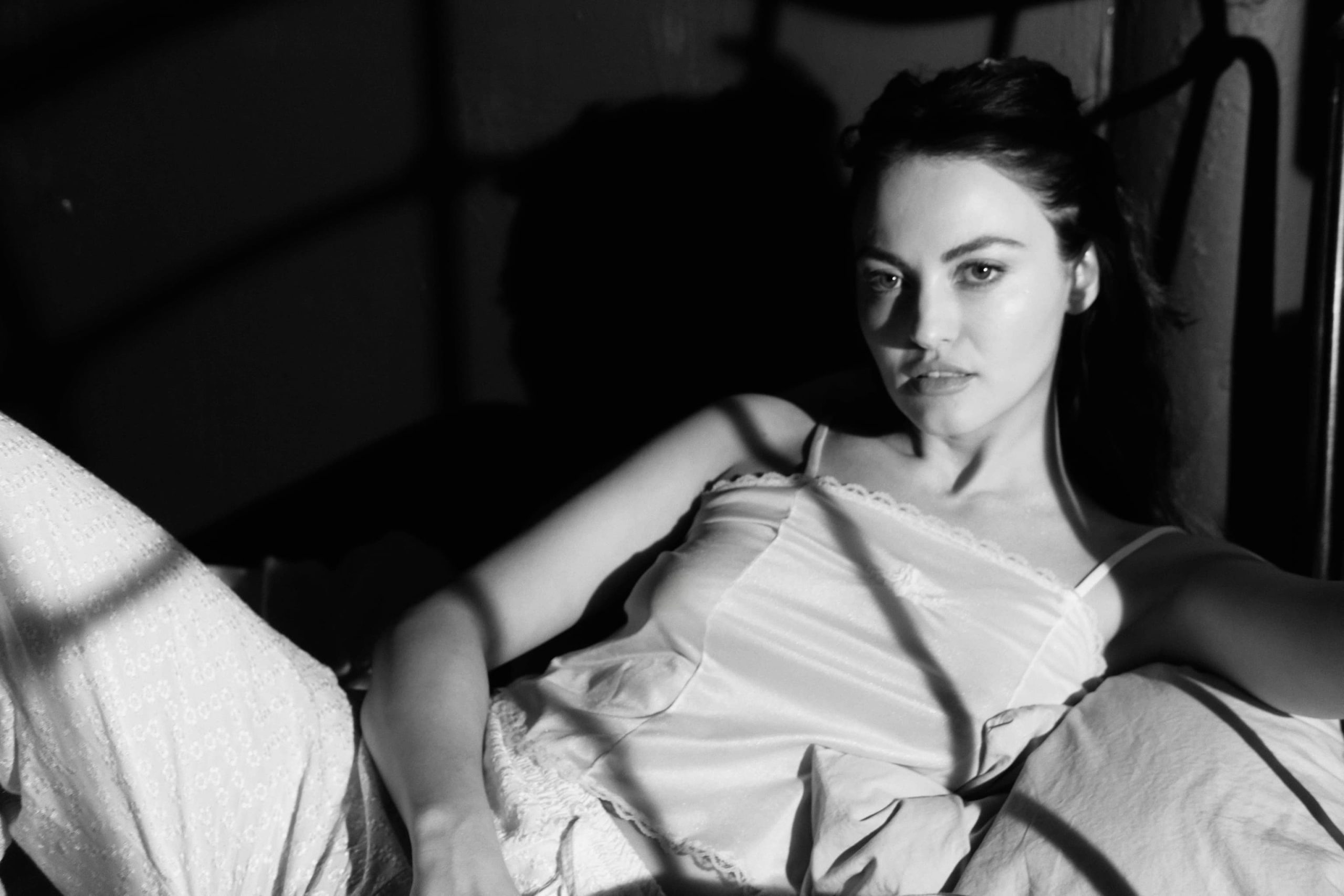Jack Reynor brings a deft approach to the ‘show don’t tell’ storytelling device in his role on The Peripheral despite having his own complicated relationships with technology.
This is the second time that Jack Reynor and I have spoken. The first time was the day before as he was on his way to the hospital for an x-ray. He’d been in a motorcycle accident a few hours earlier and hurt his ribs. So, we postponed and planned to chat the next morning instead, when he’d hopefully have a clean bill of health and the ability to give me the best possible interview (his words, not mine). I’m happy to report that not only did Jack have a clean bill of health (aside from a fractured rib, but apparently the doctor gave him the all clear).
The Peripheral is a show that takes the concept of relationships – relationships with technology, the environment, our friends and family – and explodes them. All of these varying relationships are mired with nuance. Nuance is a hard thing to convey, it’s more something you feel than show. Jack Reynor manages to show the audience nuance in this role though. He shows you the complexities of his character and the world that he lives in, and leans into those very complexities. The Peripheral and Jack don’t explain things to you, but instead they prod viewers to be more critical and ask more questions. How very lucky we are to be asking ourselves these queries.
In conversation with 1883 Magazine, Jack Reynor discusses putting on a Southern accent, the kinds of non-verbal relationships we can have with close friends, and his own complicated relationship with technology.
I wanted to start off with asking you about what draws you to a role, and what in particular about this one spoke to you?
Typically, it’ll be the material itself. It’s got to be one of two things – a great director or a great script. Sometimes it’s an absolutely brilliant director, who you really, really believe in. Sometimes you might not really be able to fully comprehend their vision when you read the script, but you know, you have to work with them. And then other times it can be the case that it’s just such a compelling piece of material.
In this instance, it was a bit of both. I’m a big fan of Vincenzo Natali [one of the show’s producers], I’m a genre-head – and he is one of the members of the great pantheon of Canadian horror filmmakers. So him bringing the product to Lisa Nolan was incredibly exciting. And I just thought that they were such an amazing bunch of people to have an opportunity to work with. And I’m a huge fan of Chloe, as well. I think Chloe’s had such a great career that’s been littered with very thoughtful work. I was looking forward to the opportunity to share some screen time with her.
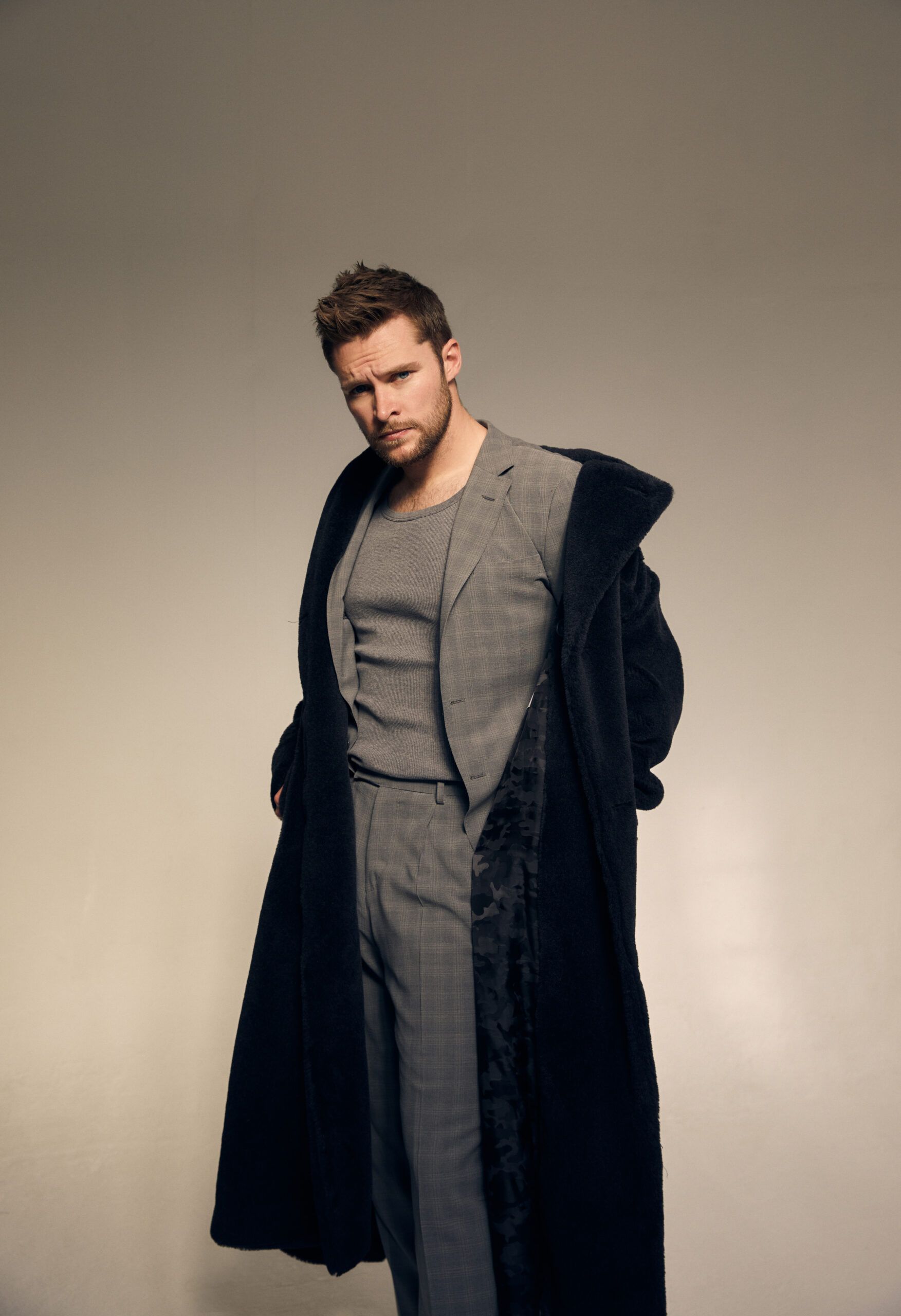 Grey Suit Boss Vest Stylist’s Own Coat Richard James Boots Manolo Blahnik
Grey Suit Boss Vest Stylist’s Own Coat Richard James Boots Manolo Blahnik
So what are some of the ways that you like to get into character? Do you create playlists that you think Burton would listen to, consume particular kinds of media?
That’s funny you should mention playlists. Chloe made me a playlist of very trashy country music that she felt would be on brand for Burton.
Really!? What songs were on there?
I can’t even remember…
Oh, so you’ve blocked it out?
[Laughs]. No, there was some good stuff on there. But in this particular instance, I think like, whatever role you play, you know, there are different requirements for the prep. And in this instance the character has a military background. And that is part of who and what he is, but that wasn’t really the thing that interested me so much as his place in his community and his sense of identity among his friends and the people who he loves.
I was thinking about those haptic implants that the guys have in their bodies in the show, how it gives them this capacity to sort of non verbally communicate and synchronize with each other. And there’s a great example of that that I see around me all the time at home in Ireland, when my friends get together and play session music. You know, like, guys who play traditional instruments. They are just absolutely extraordinary. And it’ll be five o’clock in the morning and everybody’s been drinking pints all day, and everybody’s out of their minds, but you’ll get these guys who can sit down, and they can hardly hold a conversation, they’re so inebriated – but at the same time, they can play with six people, and they can start playing music and they can just pick up cues from one another without having rehearsed anything together. It’s almost on a spiritual level, it’s really amazing. So that, paired with the identity that comes from living in the country, and being a person from a rural community. Those were interesting things to me. I was interested in trying to capture some of what I feel is an archetypal American expression of that.
I looked to Levon Helm who was the drummer from The Band. I don’t know if you’re a fan of The Band at all, but The Band plays with these amazing session musicians. There’s a great documentary that Martin Scorsese directed called The Last Waltz. And if you haven’t seen it, it’s well worth watching. Levon Helm was the drummer and singer of the band – the guy just has this unbelievable presence. And so when you hear him get interviewed, he’s really edgy. But you can tell that there’s just, a serious sort of principled human being, you know what I mean? He’s gone through some insane shit, but he’s just a really cool guy who’s really respected by all the people in this community. I just broadly love them. I think that Burton sort of fulfills that role with his friends and in his community.
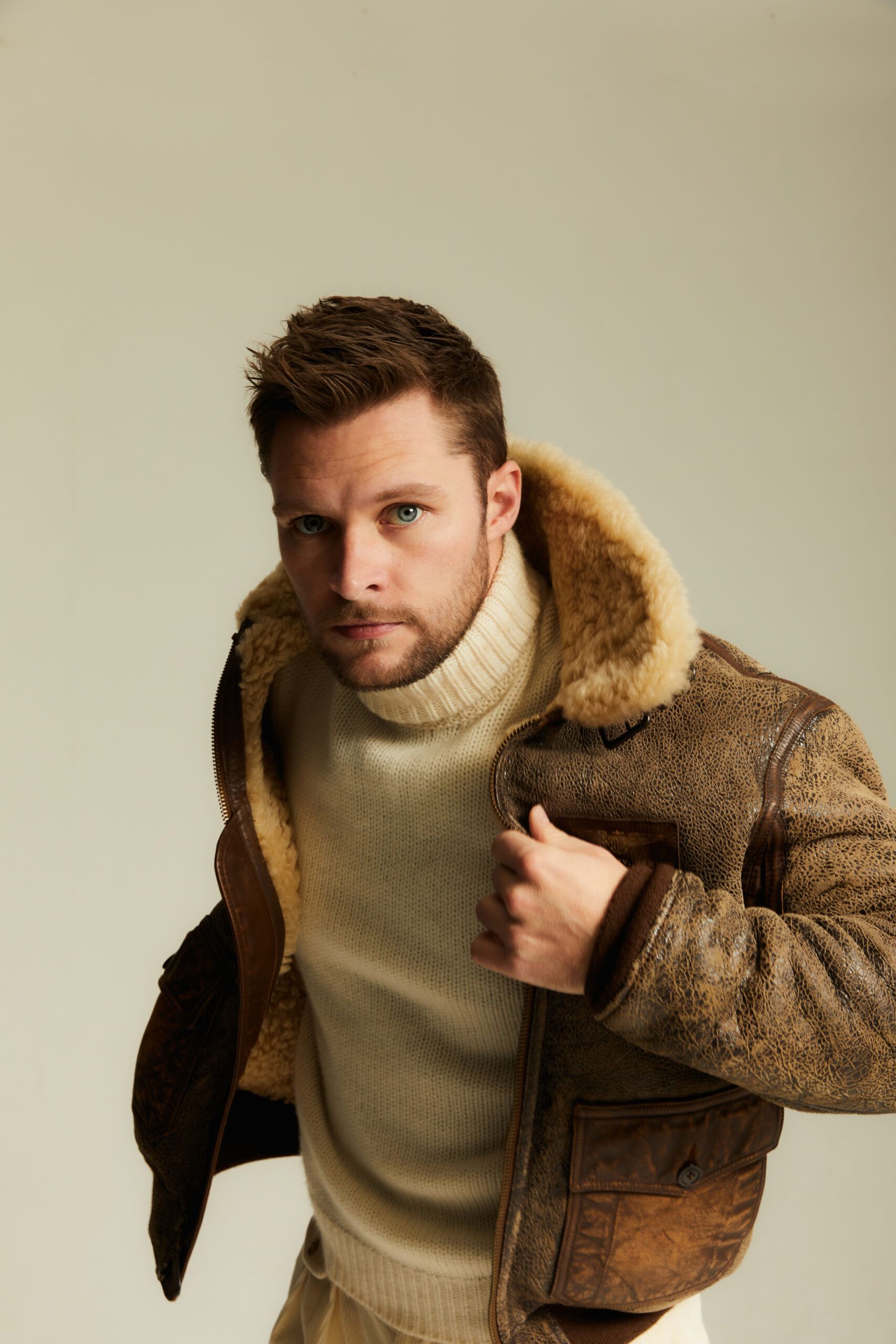 Full Look Ralph Lauren
Full Look Ralph Lauren
Definitely. As you mentioned, he did have this military stint, and he suffers from PTSD, because of some bad haptic implants. How did you prepare for that aspect of the role?
Well, I’ve done some military stuff over the years. And just with regards, you know, a couple of different projects like Saturday and the Second World War etc and and on other things besides that, I’ve had friends in the military over the years, and I’ve worked with a lot of military consultants. And I’ve spoken to some of them about their experiences of trauma. So we kind of incorporated that a little bit into the character.
But it doesn’t manifest itself in the show, in a particularly surface level way. It kind of is something that exists deep down in these characters. I think that was more my sense of how best to play it – to kind of allow it to just be something that you could probably feel in moments when you’re looking at Burton, and you can maybe see that there’s something a little bit unhinged there, and how we can kind of be a bit explosive. But we didn’t lean into it too hard necessarily, in this season of the show.
Another thing that I wanted to talk about was your relationship with Chloe. When I’m watching it, it feels very real and authentic. Do you have siblings? Because it felt like a true brother sister relationship.
Yeah, I do. And, and that obviously helps, you know, but my siblings are a lot younger than me. Chloe and I just really hit it off right away. She’s really cool. And me and her are very, very similar in a lot of ways. I think that almost immediately, we recognised each other as kindred spirits. We were able to talk very openly and trustingly with one another about our experiences, and I think that that definitely informed a lot of what you see in the characters on screen. But I think me and Chloe have an even better relationship than Burton and Flynne do on screen, you know?
I think it’s hard with actual siblings. I think it’s probably easier to be closer with people that you’re not related to.
This is a difficult industry in the sense of boundaries. It’s not an industry that promotes healthy boundaries between people. So, when you find people on set who you’re able to establish that relationship with, that has those healthy boundaries there – those relationships can be really, really rich, just really fulfilling, as well as being critical for the success of an onscreen relationship.
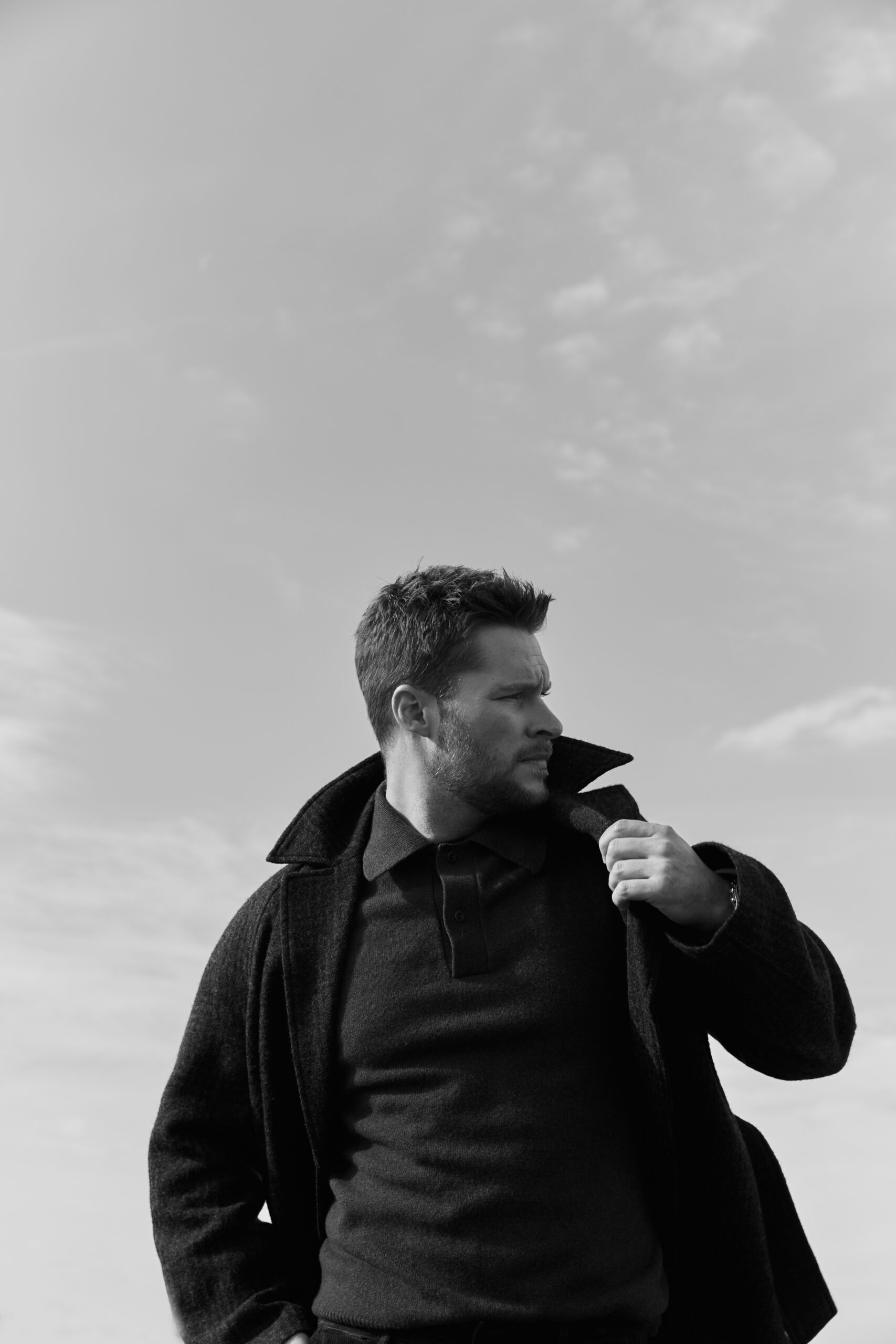
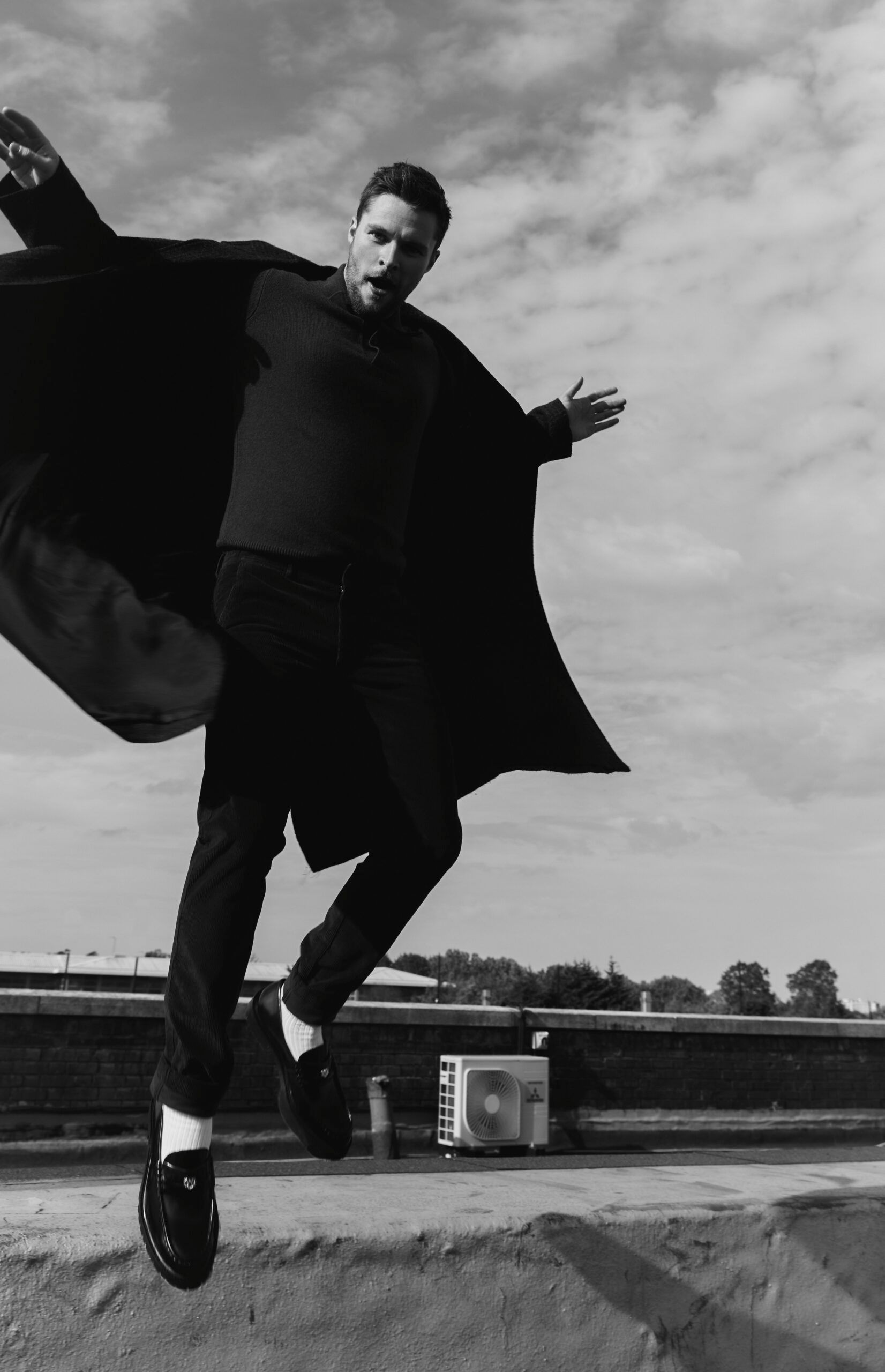 Coat Filippa K Knit Top Norse Projects Watch Breitling Trousers Mr Marvis Loafers Walk London
Coat Filippa K Knit Top Norse Projects Watch Breitling Trousers Mr Marvis Loafers Walk London
Yeah, it definitely shines through. There’s even this one scene in the first episode where she asks you how you’re doing and you kind of brush her off, and I feel like I had that exact conversation with my brother. It just felt so authentic. Like a real sibling dynamic. This isn’t your first television role, but most people probably know you from movies like Midsommar or Transformers. What do you feel are the differences between acting in a TV show versus a film?
It’s the workload. There’s a different level of confluence I suppose when you’re working on a film.
I’ll put it this way, if you’re doing a feature film, typically you’re shooting something between 90 and 120 pages. If it’s a tiny little micro budget movie, maybe you’ll shoot it over three weeks. But more likely, you’re going to shoot it for something between three and five months. When you’re shooting a big TV show like this, you’re all of a sudden shooting six to eight hundred pages in that same five month or six month period. It’s the sheer volume that you’re dealing with, it’s very hard to have the mental capacity to be able to drop one scene in an episode here and come into a completely different episode, a different scene with a totally different thing going on. It’s less focused, it’s a little less forgiving of your performance in certain ways.
At the same time, I think, for soul actors, that pressure can be a bonus, and they can actually be helpful. I work pretty well under pressure. And I know Chloe certainly does too. At the end of the day, when I started about 10 years ago, my sole focus was film. I only wanted to do films. I had no interest at all in doing television. And it’s amazing to see how the industry has evolved over the last decade. Limited series are taking over the place of event movies now, in a very real way. We’re having to evolve with the times. And to be honest with you, I do feel like we see it with this show. It’s great to be able to tell a story over eight episodes and to just have the time and the space to let that really organically breathe for the audience, you know?
In an early episode, Burton’s avatar (“Peripheral” in the show) is being controlled by his sister Flynne. What was it like to play a character being played by another character? Was there anything specific that you felt like you had to do? Because that would just be, “so Chloe playing Flynne, playing Burton?”
I called Chloe and we had a good long talk before we shot the scene. For me, that was kind of one of the things that I thought was a fun challenge. Particularly because I did trust Chloe so much, I was able to just give her a bit of control over my performance and what I was going to do, and for her to have some authorship and be able to inform how I played it a little bit. That was really cool. We settled on a version that wasn’t trying to be a carbon copy of Flynne, but it was trying to be Flynne enjoying the experience of being in a male body and seeing the world through the other gender’s eyes for an hour or so. And then, you know, the experience of sharing that kiss with another woman for the first time through a male body. That was a pretty interesting subject. So we talked at length about that stuff. And yeah, I just had fun doing it.
So I take it you’re not actually southern. What was it like putting that accent on for the series?
It was good. It was fun. I like doing different dialects. Chloe was giving me some pointers on that. But I’ve also got a great dialect coach. He did quite a lot of work with me on it, it was good fun. I kept the accent on 24/7 for the first two months.
I think that when I met Vincenzo one day with my Irish accent on for the first time, he thought it was a joke and that I was doing a terrible Irish accent. I think some of the crew were pretty surprised as well when they heard me in my own accent because Irish people have quite lyrical accents – there’s a lot of up and down in the intonations. Less so with the vast majority of American accents. It’s interesting, when your dialect actually changes your personality, if you keep it on, you know?
 Full Look Ralph Lauren
Full Look Ralph Lauren
Did you notice any personality changes, the longer you used the accent?
People would relate to me differently when I was in Burton mode.
How so? What was different in the way that they related to you?
Well… People were, I think, a little bit less forthcoming with me, unless they had spent a lot of time around me as Burton and they felt that they knew me a bit better. I just think people were less inclined to approach me when I wasn’t Irish.
Interesting. I guess that speaks well of the Irish then!
I guess so [laughs].
There are some very intense fight scenes throughout this series. What was it like shooting those?
It was pretty fun. I love that stuff. I’ve definitely spent a lot of my career doing quite emotionally, and mentally demanding performances. And I’m really happy with how it’s gone for me over the last decade, but, it’s nice to be part of something where you’re turning up doing a lot of action stuff all the time, because that’s just a lot of fun. Like, yes, obviously, you’re thinking about your character and there are scenes with some emotional weight and some dramatic context for Burton and Flynne together and stuff… But the action stuff is like being an athlete. You know what I mean? It’s training. You train physically all the time for it. You know, you do your weapons, training, all that kind of business. And then you go in, you just have fun with it. And that’s it. It makes the job really easy and really fun.
In the first episode of the series there’s a fight scene in a car. It must have been very heavily choreographed. For something like that you have to time each movement perfectly – especially when you’re shooting in tight quarters like in a car. Everything has to be just so. Can you tell me a little bit about what it’s like shooting scenes like that?
Yeah! I mean, it’s not all that dissimilar from dancing or playing music. It’s just you with your partner in the scene, whoever it is, or whatever group of people that may be. You basically just have to get into a rhythm with one another.
It comes down to trust. You have to trust the people that you’re working with that they’re not going to take you out by throwing punches at the wrong time. You also have to trust yourself that when they tell you, “Okay, you should go for it here,” that you really go for it.
I remember, there was one scene where I was fighting a stuntwoman. I basically had to grab her by the throat and just dump her on the ground.She was like, “Dude, you need to go for it because it’s gonna like shit if you don’t really do it.” I was like, fucking hell, man, every fibre of my body is telling me not to assault this woman, right? But I had to do it, and it ended up looking great. You just have to trust yourself to go there. Because these people know what they’re doing. They’re super well trained professionals. And they’re there to make you look good at the end of the day.
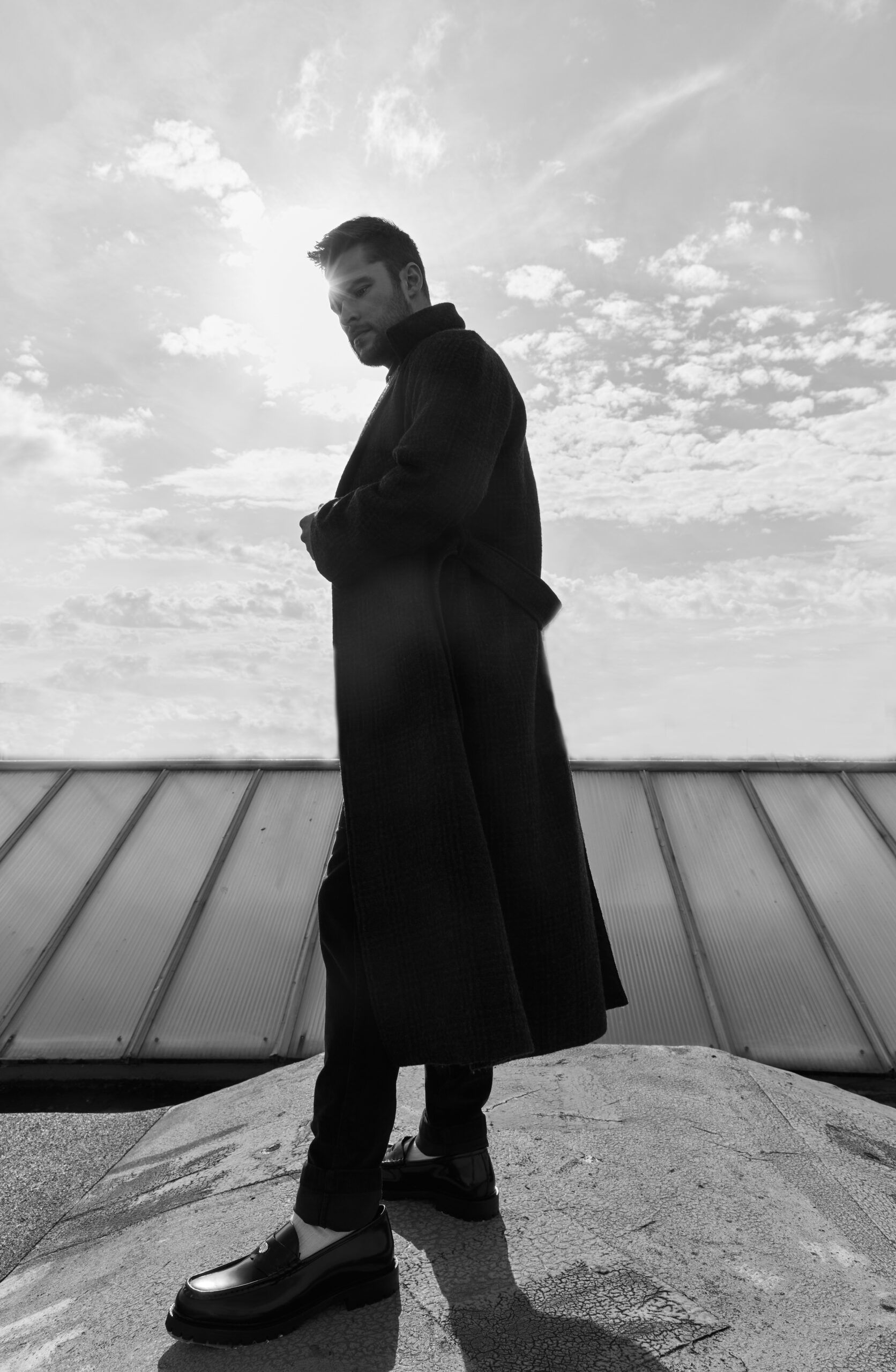 Coat Filippa K Knit Top Norse Projects Watch Breitling Trousers Mr Marvis Loafers Walk London
Coat Filippa K Knit Top Norse Projects Watch Breitling Trousers Mr Marvis Loafers Walk London
Another thing that The Peripheral highlights is how technology alters the connections that we forge with people. What’s your relationship with technology like?
Hmm, it’s complicated. I think I’m a serious fucking gadget man, like my girlfriend and all of my mates really take the piss out of me for always having gadgets. I love gadgets. I buy them straight away, like the PS5 – I got it the moment it came out. And the XBOX the moment it came out too. I’m like that with cameras as well.
Phones are so dangerous. They just suck your life away. I’ve spent the last three years off all social media and I just came back onto Instagram, when we started the show, just for the promotion. And I realized that it’s worth having a presence on Instagram, provided that you can have a balanced lifestyle.That means not sitting there flicking through reels for four hours a day, or watching seven second clips of people getting knocked out. It’s hard not to fall into that rhythm sometimes, though.
I imagine as an actor too that being on social media and having a presence online is almost a prereq for the job. That must be challenging to navigate.
It’s becoming more and more like that. And I hate to say this, but I have been hearing that there have been casting decisions made around Instagram followers.
I’m not surprised in the slightest. That’s not shocking.
That’s really… It’s not shocking, but it is horrifying. You know,
It’s disappointing.
Oh, it’s totally disappointing, dude. I definitely did not get into this industry to be a social media personality. I’m not interested in that. I’m here because I like the acting part. That’s it. That’s all I care about. So you know, it’s tough. But yeah, I try to detox from devices when I can, you know, sometimes I’ll like to get rid of the iPhone altogether and I’ll just spend a lot of time outdoors.
On motorcycles in Nepal, perhaps?
Yeah, exactly. Perfect. Case in point right there. There’s gonna be no cell service up there.
 Coat Filippa K Knit Top Norse Projects Watch Breitling Trousers Mr Marvis Loafers Walk London
Coat Filippa K Knit Top Norse Projects Watch Breitling Trousers Mr Marvis Loafers Walk London
Well, this is my last question for you. I know that you’re a big fan of sci fi. To me, sci fi is often a warning of how technology can impact and hurt us. So when I think of authors like Ray Bradbury, Isaac Asimov, Kurt Vonnegut – their work offers us a glimpse into a future that seems really shiny and brilliant on surface level. And then upon further inspection, you realize that things aren’t as good as they seem. Often it warns us of our power to destroy ourselves. If you had to say what The Peripheral’s warning to its audience is, what do you think that would be?
I think it kind of carries on in that tradition. It’s basically an indictment of our abuse of technology and how we are progressing with it. I think that’s what distinguishes The Peripheral from a lot of other stuff in the genre – the material is basically giving the audience an opportunity to see an alternative through the relationship between Flynne and Burton and the people in their lives. I think that that’s actually what’s at the heart of the show – these people are seeing a dystopian future that is almost a century off. And they have no idea how they’re going to be able to deal with it. But they’ve recognised that it’s an imperative that they at least strive for something better, something that’s an alternative to this, for not just themselves, but for the sake of the people that they love. And that for me is where the message of the show really lies.
The Peripheral is out now on Amazon Prime Video.
Interview Kendall Saretsky
Photography Klara Waldberg
Hair & Grooming Jon Chapman at Carol Hayes Management using @drbarbarasturm skincare
and @daimonbarber
Styling Bertie Taylor-Smith

